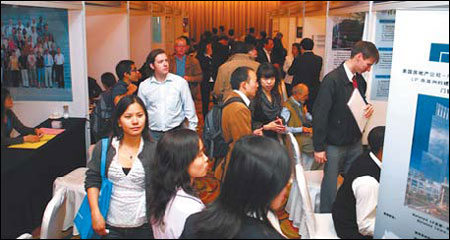They're from the United Kingdom, Austria, Pakistan or the United States. Hundreds of job hunters gather at the Swissotel in Beijing on an April afternoon. They're smiling, chatting and full of expectation. Their positive mood stands in striking contrast to the gloom overshadowing their home countries, where the economy is facing the most severe downturn in decades.
Catchwords such as "bankruptcy", "depression" and "recession" are dominating the headlines there. But in Beijing it's not a belly-up, it's a thumbs up.
"It's the seventh time that the Chinajob.com job fair has taken place, and never before there were so many visitors," says Michael Li, organizer of the event, which attracted more than 1,100 job hunters, more than double than last year.
"China and especially Beijing are less affected by the crisis than almost anywhere else," explains Li's colleague Christina Yang.
There is still an increase in the job market - and not only in terms of quantity of positions, but also the quality. "Compared to previous years, the jobs offered demand higher qualification and imply a higher salary," she says.
Language teaching positions are still the top dog: 37 out of 56 exhibitors at the job fair were looking for foreign language experts, like Argentine Laura Leiro, who strolls through the fair booths with a pack of CVs in her hand.
The 25 year old came to Beijing to studying Chinese and wants to finance it by teaching Spanish.
"I plan to do that for a year or two and then make the most out of my multilingualism," she says.
Fred Khan, 31, from Pakistan already works as an English teacher. He regards the job fair as a chance to test his market value and "to see about the possibilities".
After three years in Beijing, both he and his wife feel at home, he says.
|

|
|
Peter Strijdonk visits the Chinajobs.com job fair for networking purposes. [China Daily] |
"Beijing is incredible peaceful compared to other international cities - and China is just an ocean of opportunities," he says.
As China's economy continues to grow, even though much lower than recent years, the influx of expat grows with it, especially if the foreigner has something to bring to the developing economy. China has become a paradise for skilled foreigners.
One of them is Peter Strijdonk. Like many visitors at the job fair, his mood is running high. The Dutchman moved to China just six months ago, and he is very enthusiastic about his new life.
"While a lot of people in Europe are very insecure about their future now, here you can feel a positive vibe everywhere," he says.
When Strijdonk came to China, he founded a consultant firm named Small Steps Coaching - and the move became a great big step for himself.
He would never have dared to start his own business in Europe he says.
Strijdonk visits the Chinajobs.com job fair for networking purposes and also to look at the very foreigner friendly job market, he says.
|

|
|
More expats look for jobs at the job fair held in Beijing. [China Daily] |
"When you look at China, there are great future prospects almost everywhere," says Strijdonk.
"There's energy, and there's room for initiative. If you want to reach a certain business goal, then you can do it."
For newly arrived foreigners, diving into a teaching job is the most popular starting point, but other opportunities arise, explains Flora Sheng from international removal company AGS Four Winds.
The Beijing branch of her company organizes about 50 removals per month.
At the moment only one third of them are moving in clients, but Sheng is convinced the peak of the crisis-driven expat exodus has already passed.
"At the dawn of the crisis many big international corporations sent their overseas employees and their families back home," Sheng says.
Now the tide is about to turn again. "Inbound removals regain territory, especially from France and South Africa," she says.
Bernd Reitmeier is seeing the same trend occurring in the German expatriates community. The deputy delegate of the Delegation of German Industry and Commerce in Shanghai says German expats have not left China in such massive numbers compared to Koreans or Americans.
"While for example the Korean community in Shanghai shrank from 100,000 to 50,000 within only five months, the returnee ratio of Germans is estimated to be only 3 to 5 percent," Reitmeier says.
About 8,500 Germans live in Shanghai today - eight times more than when Reitmeier arrived 10 years ago.
"The Germans will be coming to China in great numbers," Reitmeier predicts.
German companies in China are more immune to the crisis than their American counterparts, as their focus is less on export and more on the local market.
And the Chinese market is still doing comparatively well.
Reitmeier believes China "in the long run will be the winner from this economic crisis".
For Clemens Helbock, founder and CEO of the expat job site ixpat.com, China is already the winner.
"Many foreigners realize that job perspectives in their home economies are far from bright while at the same time there is still growth in China," he says.
"And growth attracts workforce." On ixpat.com there were 30 percent more job offerings in March 2009 compared to the same period in the previous year.
In view of the global economic crisis, Helbock expects a swelling influx of what he calls "inpats".
"These are foreigners who are young, ambitious and willing to work on a local contract in exchange for experience and the perspective of long-term settlement," he says.
Localization is a major trend - and this true not only for the foreign companies' expat salaries, but also for their target market.
According to the new Business Climate Survey conducted by the American Chamber of Commerce more than 60 percent of the American companies said pursuing the Chinese market is their main reason for operating in China - compared to a mere 51 percent in 2008.
More than 80 percent of the American companies said they feel optimistic about their five-year business outlook in China.
In fact, these organizations do not consider the economic slowdown as the dominating challenge.
Bigger threats are the protection of intellectual property rights - and the problem of finding and retaining qualified talent.
A study conducted by the consulting firm Watson Wyatt arrives at the same conclusion.
"Attraction of qualified talent" is the greatest business challenge for multinational companies in China.
China is still in need of a brain gain. One of the companies at the job fair in great need of expat experts is China's oldest steel company Shougang.
It offers 19 engineering and two financial expert positions at the fair, "but there are just not enough suitable applicants for those positions," Shougang HR manager Hu Yuping says.
The world's number 14 tire producer Triangle, a few booths on, is facing the same problem.
"It's quite hard to find foreign experts in fields like tire engineering, mechanical engineering or international trade," Triangle interpreter Richard Hu explains.
(China Daily April 27, 2009)